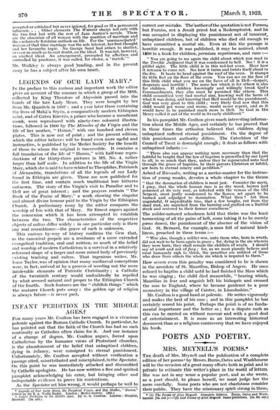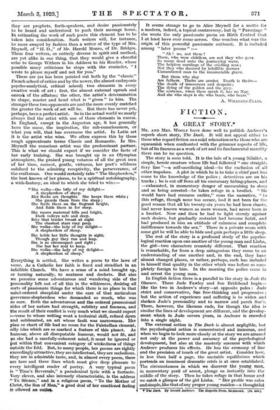POETS AND POETRY.
MRS. MEYNELL'S POEMS.* THE death of Mrs. Meynell and the publication of a complete edition of her poems, by Messrs. Burns, Oates and Washbourne will be the occasion of a great many efforts both in print and in private to estimate this writer's place in the world of letters.
She was not in any sense a popular poet, and as she wrote, as a poet should, to please herself, we must judge her the more carefully. Some poets who are not charlatans consider their public. They have the missionary spirit strong in them,
• (1) The Poems of Alice Meynell. Complete Edition. Burns, Oates and Wash.. bourne. [66. net.]—(2) Last Poems of Alin Meynell. Same publishers. 13s. ed. net.]
they are prophets, forth-speakers, and desire passionately to be heard and understood to push their message home. In estiknating the work of such poets this element has to be taken into consideration. Such writers will, for instance, be more swayed by fashion than a writer of the type of Mrs. Meynell, of " H. D.," of Mr. Harold Monro, of Dr. Bridges. These four writers, so entirely diverse hi spirit and method, are yet alike in one thing, that they would give a cheerful echo to George Withers in his Address to his Reader, whose possible saucy criticisms- he stops with the reminder, " I wrote to please myself and not for you." There are (as has been pointed out both by the " classic " French school of critics and by the newer, the almost embryonic psycho-analytical, critical school) twa elements in every creative work of art : first, the almost external uprush and onrush of the afflatus; the other, the artist's determination to shape, master and bend what is " given " to him. The stronger these two opponents are and the more evenly matched the greater the work of art will be. But there has never yet, .perhaps, been a perfect artist. So in the actual world we nearly always find the artist with one of these elements in excess. In England, except in the Augustan age, it has generally been the muse, the inspiration, the sub-consciousness, or hat you will, that has overcome the artist. In Latin art t is the artist who wins. We often express this by those rough approximate terms Classic and Romantic. In Mrs. Meynell the conscious artist was the predominant partner. This is what we should expect if we consider the facts of her early training. She was brought up in an Olympian atmosphere, the praised young votaress of all the great men of her time, earnest, gentle, virtuous, her poet's wildness subdued to the. admiring receptivity, the perseverance, of the craftsman. One would certainly take " The Shepherdess," the best known of her pieces, to be a spiritual autobiography, a wish-fantasy, an ideal to which she tried to win:—
I` She walks—the lady of my delight—
A shepherdess of sheep.
Her flocks are thoughts. She keeps them white ; She guards them from the steep •
She feeds them on the fragrant height,
And folds them in for sleep.
She roams maternal hills and bright, Dark valleys safe and deep. Into that tender breast at night The chastest stars may peep,
She walks—the lady of my delight—
A shepherdess of sheep.
She holds her little thoughts in sight, Though gay they run and leap. She is so circumspect and right ; She has her soul to keep.
She walks—the lady of my delight—
A shepherdess of sheep..'
Everything is settled. She writes a poem to the laws of verse. As a. Catholic her faith is fixed and steadfast in an infallible Church. We have a sense of a mind brought up, or turning naturally; to neatness, and dockets. But also we perceive some adventurous and wandering side of the personality left out of all this in the wilderness, desiring all sorts of passionate things for which there is no place in that mind-ordered sheepfold under the care of that meticulous governess-shepherdess who demanded so much, who was so sure. Both the adventurous and the ordered processional sides of her nature had strength, subtlety and fineness, and the result of their conflict is very much what we should expect .-verse to whose writing went a. technical skill, refined down and sublimated, an art whose fault. was narrowness.. iter plan or chart of life had no room for the Falstaffian element, Silly isles which are so marked a feature of this planet. As Humour, above all disreputable humour, would not fit, and
she had a carefully-coherent mind, it must be ignored or put within that convenient category of wickedness of things ontside the fold. But, to many people, her poems are rightly exceedingly attractive, they are intellectual, they are melodious, they are in admirable taste, and, in almost every poem, there are here and there lines which must give deep pleasure to every intelligent reader of poetry. A very typical poem is " Time's Reversals," a paradoxical lyric with a footnote. Very clever, and also intensely characteristic, is the address " Ta Silence," and in a religious poem, " To the Mother of Christ, the Son of Man," a good deal of her emotional feeling allOwed as °nth* It seems strange to go to Alice Meynell for a motto for a modern, indeed, a topical controversy, but in " Parentage " she wrote the only passionate poem on Birth Control that I at least have ever Come across. One wonders what was the origin of this powerful passionate outburst. It is included among " later poems " :- " Ah I no, not these I These, who were childless, are not they who gave So many dead unto the journeying wave, The helpless nurslings of the cradling seas ; Not they who doomed by infallible decrees Unnumbered man to the innumerable grave.
But those who slay Are fathers. Theirs are armies. Death is theirs— The death of innocences and despairs ; The dying of the golden and the grey. The sentence, when these speak it, has no Nay. And she who slays is she who bears, who bears."
A. WuIlium-Ems.











































 Previous page
Previous page